The Sandy Bridge Review: Intel Core i7-2600K, i5-2500K and Core i3-2100 Tested
by Anand Lal Shimpi on January 3, 2011 12:01 AM ESTThe 6-series Platform
At launch Intel is offering two chipset families for Sandy Bridge: P-series and H-series, just like with Lynnfield. The high level differentiation is easy to understand: P-series doesn’t support processor graphics, H-series does.
There are other differences as well. The P67 chipset supports 2x8 CrossFire and SLI while H67 only supports a single x16 slot off of the SNB CPU (the chip has 16 PCIe 2.0 lanes that stem from it).
While H67 allows for memory and graphics overclocking, it doesn’t support any amount of processor overclocking. If you want to overclock your Sandy Bridge, you need a P67 motherboard.
6Gbps
Had SSDs not arrived when they did, I wouldn’t have cared about faster SATA speeds. That’s how it worked after all in the evolution of the hard drive. We’d get a faster ATA or SATA protocol, and nothing would really change. Sure we’d eventually get a drive that could take advantage of more bandwidth, but it was a sluggish evolution that just wasn’t exciting.
SSDs definitely changed all of that. Today there’s only a single 6Gbps consumer SSD on the market—Crucial’s RealSSD C300. By the middle of the year we’ll have at least two more high-end offerings, including SandForce’s SF-2000. All of these SSDs will be able to fully saturate a 3Gbps SATA interface in real world scenarios.
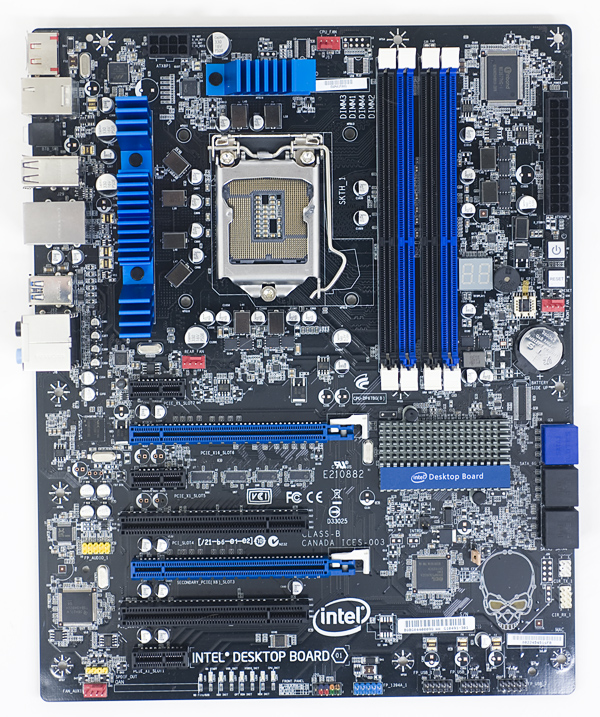
Intel's DP67BG—The blue SATA ports on the right are 6Gbps, the black ones are 3Gbps
To meet the soon to be growing need for 6Gbps SATA ports Intel outfits the 6-series PCH with two 6Gbps SATA ports in addition to its four 3Gbps SATA ports.
I dusted off my 128GB RealSSD C300 and ran it through a bunch of tests on five different platforms: Intel’s X58 (3Gbps), Intel’s P67 (3Gbps and 6Gbps), AMD’s 890GX (6Gbps) and Intel’s X58 with a Marvell 9128 6Gbps SATA controller. The Marvell 91xx controller is what you’ll find on most 5-series motherboards with 6Gbps SATA support.
I ran sequential read/write and random read/write tests, at a queue depth of 32 to really stress the limits of each chipset’s SATA protocol implementation. I ran the sequential tests for a minute straight and the random tests for three minutes. I tested a multitude of block sizes ranging from 512-bytes all the way up to 32KB. All transfers were 4KB aligned to simulate access in a modern OS. Each benchmark started at LBA 0 and was allowed to use the entire LBA space for accesses. The SSD was TRIMed between runs involving writes.
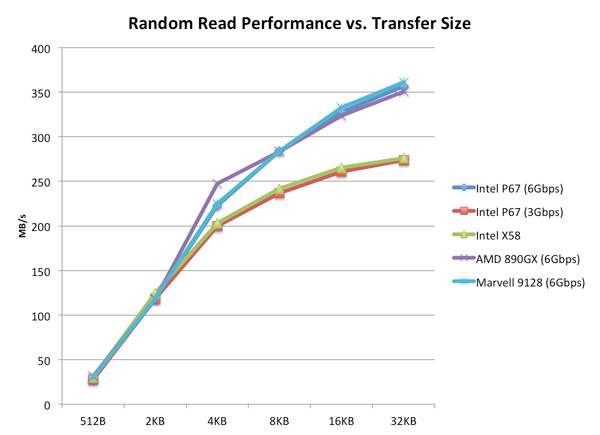
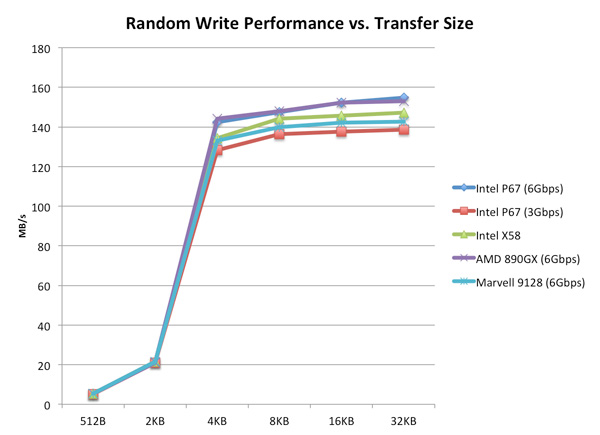
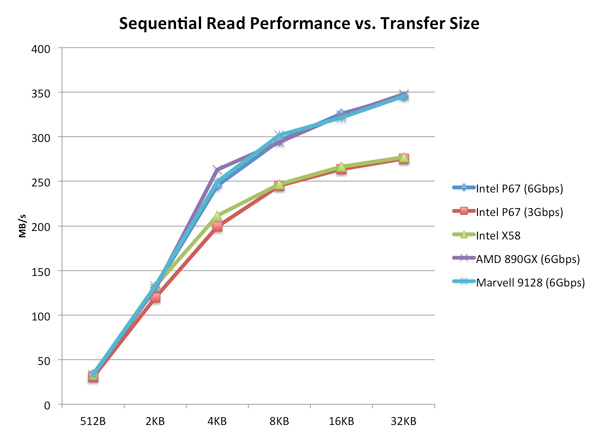
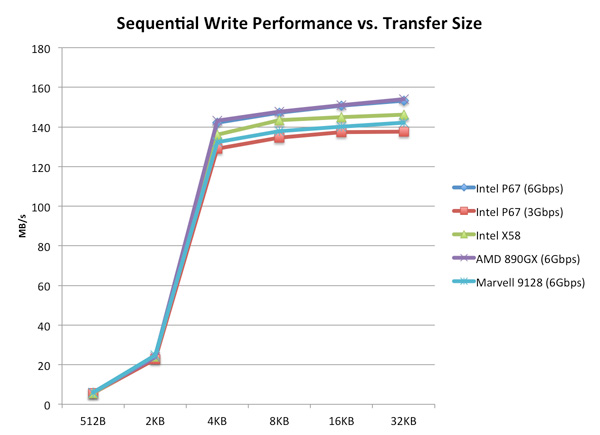
Among Intel chipsets I found that the X58 has stellar 3Gbps SATA performance, which is why I standardize on it for my SSD testbed. Even compared to the new 6-series platform there are slight advantages at high queue depths to the X58 vs. Intel’s latest chipsets.
Looking at 6Gbps performance though there’s no comparison, the X58 is dated in this respect. Thankfully all of the contenders do well in our 6Gbps tests. AMD’s 8-series platform is a bit faster at certain block sizes but for the most part it, Intel’s 6-series and Marvell’s 91xx controllers perform identically.
I hate to be a bore but when it comes to SATA controllers an uneventful experience is probably the best you can hope for.


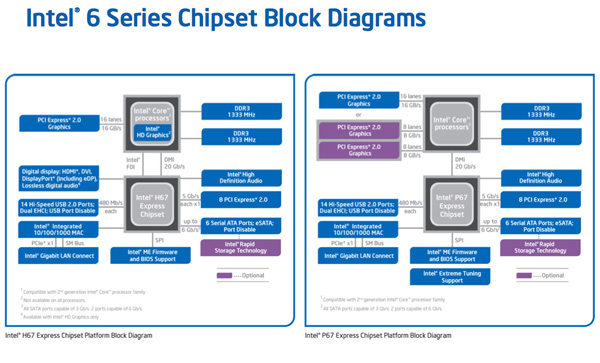








283 Comments
View All Comments
Rick83 - Monday, January 3, 2011 - link
I just checked the manual to MSI's 7676 Mainboard (high-end H67) and it lists cpu core multiplier in the bios (page 3-7 of the manual, only limitation mentioned is that of CPU support), with nothing grayed out and overclockability a feature. As this is the 1.1 Version, I think someone misunderstood something....Unless MSI has messed up its Manual after all and just reused the P67 Manual.... Still, the focus on over-clocking would be most ridiculous.
Rick83 - Monday, January 3, 2011 - link
also, there is this:http://www.eteknix.com/previews/foxconn-h67a-s-h67...Where the unlocked multiplier is specifically mentioned as a feature of the H67 board.
So I think anandtech got it wrong here....
RagingDragon - Monday, January 3, 2011 - link
Or perhaps CPU overclocking on H67 is not *officially* supported by Intel, but the motherboard makers are supporting it anyway?IanWorthington - Monday, January 3, 2011 - link
Seems to sum it up. If you want both you have to wait until Q2.<face palm>
8steve8 - Monday, January 3, 2011 - link
so if im someone who wants the best igp, but doesn't want to pay for overclockability, i still have to buy the K cpu... weird.beginner99 - Monday, January 3, 2011 - link
yep. This is IMHO extremely stupid. Wanted to build a PC for someone that mainly needs CPU power (video editing). An overclocked 2600k would be ideal with QS but either wait another 3 month or go all compromise...in that case H67 probably but still paying for K part and not being able to use it.Intel does know how to get the most money from you...
Hrel - Monday, January 3, 2011 - link
haha, yeah that is stupid. You'd think on the CPU's you can overclock "K" they use the lower end GPU or not even use one at all. Makes for an awkward HTPC choice.AkumaX - Monday, January 3, 2011 - link
omg omg omg wat do i do w/ my i7-875k... (p.s. how is this comment spam?)AssBall - Monday, January 3, 2011 - link
Maybe because you sound like a 12 year old girl with ADHD.usernamehere - Monday, January 3, 2011 - link
I'm surprised nobody cares there's no native USB 3.0 support coming from Intel until 2012. It's obvious they are abusing their position as the number 1 chip maker, trying to push Light Peak as a replacement to USB. The truth is, Light Peak needs USB for power, it can never live without it (unless you like to carry around a bunch of AC adapters).Intel wants light peak to succeed so badly, they are leaving USB 3.0 (it's competitor) by the wayside. Since Intel sits on the USB board, they have a lot of pull in the industry, and as long as Intel wont support the standard, no manufacturer will ever get behind it 100%. Sounds very anti-competitive to me.
Considering AMD is coming out with USB 3.0 support in Llano later this year, I've already decided to jump ship and boycott Intel. Not because I'm upset with their lack of support for USB 3.0, but because their anti-competitive practices are inexcusable; holding back the market and innovation so their own proprietary format can get a headstart. I'm done with Intel.